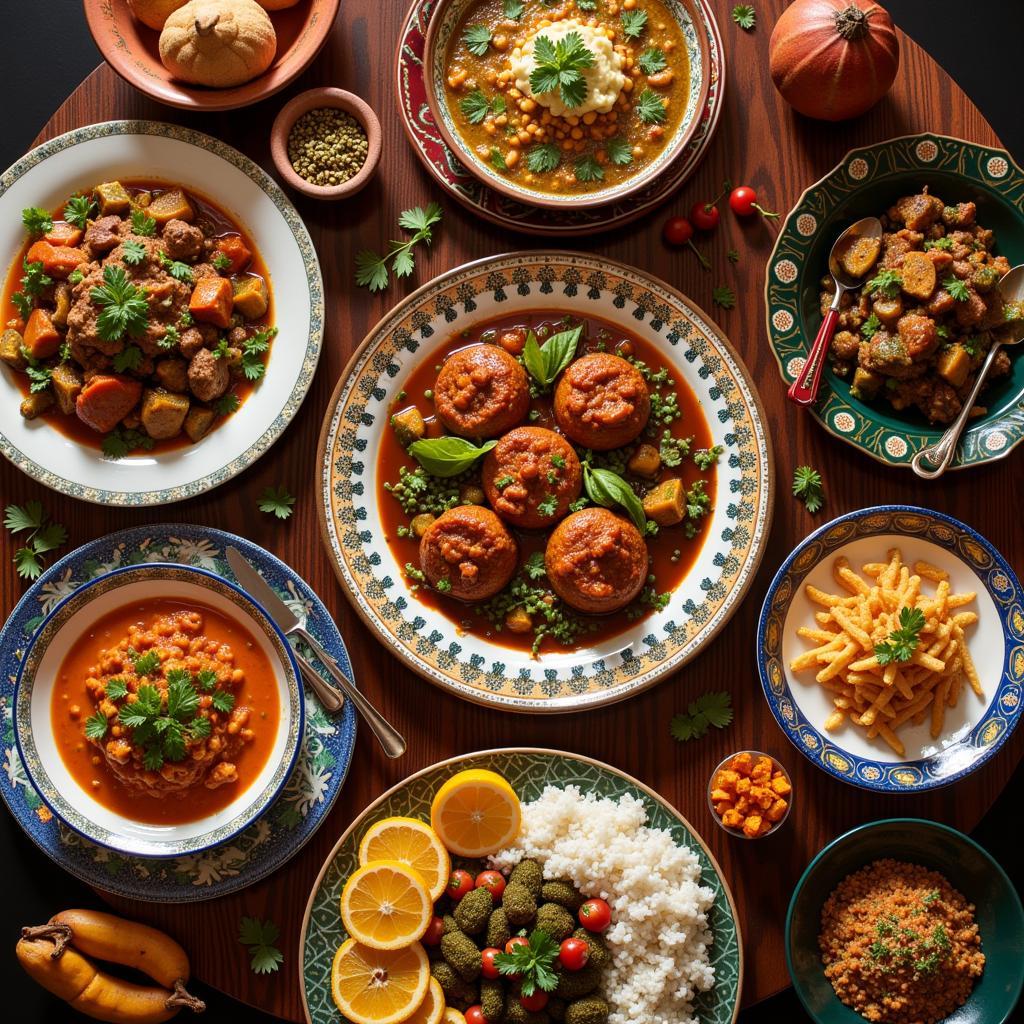A Taste of Africa: Exploring African Grilled Chicken
African Grilled Chicken, a staple across the continent, offers a vibrant culinary journey. From the smoky suya of Nigeria to the piri-piri chicken of Mozambique, each region boasts its unique marinade and grilling techniques. This article delves into the art of African grilled chicken, exploring its diverse flavors, cultural significance, and offering tips for recreating these delicious dishes at home.
Whether you’re a seasoned grill master or a kitchen novice, preparing African grilled chicken offers a chance to experience the rich tapestry of African cuisine. This culinary adventure promises to tantalize your taste buds and transport you to the heart of Africa. You can even find some amazing African dishes near me.
The Magic of Marinades: Unveiling the Secrets of African Grilled Chicken
Marinades are the soul of African grilled chicken. They infuse the meat with complex flavors, tenderize it, and create a beautiful charred exterior when grilled. Each country, even each family, has its treasured recipe, passed down through generations. These marinades often feature a blend of aromatic spices, herbs, and sometimes fermented ingredients, resulting in a symphony of tastes. From the fiery ginger and chili-based marinades of West Africa to the more herbaceous and citrusy blends of East Africa, the variations are endless.
Regional Variations: A Culinary Safari Across the Continent
African grilled chicken is not a monolithic dish; it’s a celebration of diversity. Let’s embark on a culinary safari, exploring the regional variations of this beloved dish:
- West Africa: Think suya, the spicy, smoky grilled chicken of Nigeria, often seasoned with ground peanuts and a fiery blend of spices. Ghana’s kelewele, grilled plantains, often accompany this flavorful chicken.
- East Africa: Kenya’s kuku choma, marinated in a mixture of ginger, garlic, and lemon, offers a zesty and refreshing take. In Tanzania, mishkaki, small skewers of marinated meat, are a popular street food, often featuring chicken.
- Southern Africa: South Africa’s braai, a social gathering centered around grilling, often features chicken marinated in peri-peri sauce, a fiery chili-based condiment. Mozambique’s galinha assada, roasted chicken with lemon and herbs, is another classic dish.
- North Africa: Morocco’s tagine, although traditionally cooked in a clay pot, can also be adapted for grilling chicken, infusing it with aromatic spices like cumin, coriander, and saffron.
Grilling Techniques: From Charcoal Fires to Modern Grills
The traditional method of grilling African chicken involves charcoal fires, which impart a distinct smoky flavor. However, modern grilling methods, such as gas grills and oven broiling, can also be used to achieve delicious results. The key is to maintain a consistent heat and ensure the chicken is cooked through without drying out.
Recreate the Magic at Home: Tips for Perfect African Grilled Chicken
Want to bring the taste of Africa to your kitchen? Here are some tips for grilling African chicken at home:
- Choose your marinade: Explore different regional recipes and experiment with flavors.
- Marinate generously: Allow the chicken to marinate for at least 2 hours, or preferably overnight, for maximum flavor penetration.
- Preheat your grill: Ensure your grill is hot and clean before grilling.
- Grill over medium heat: Avoid high heat, which can char the outside before the inside is cooked.
- Use a meat thermometer: Check the internal temperature of the chicken to ensure it reaches 165°F (74°C).
For those looking for pre-made options, explore African fooditems.
From Street Food to Fine Dining: The Cultural Significance of African Grilled Chicken
African grilled chicken is more than just a meal; it’s a cultural experience. It’s a staple of street food vendors, a centerpiece of family gatherings, and even finds its place in upscale restaurants. It represents community, celebration, and the rich culinary heritage of Africa. You might even be surprised at the African country foods for vacancies.
Chef Adebayo Abidemi, a renowned expert in West African cuisine, notes, “African grilled chicken is a testament to the ingenuity and resourcefulness of African cooks. It’s a celebration of flavor, community, and tradition.”
Conclusion: Embark on Your African Grilled Chicken Adventure
African grilled chicken is a testament to the diverse and vibrant culinary landscape of the continent. From the spicy suya of Nigeria to the piri-piri chicken of Mozambique, each bite tells a story of flavor, tradition, and cultural heritage. So, fire up your grill, experiment with marinades, and embark on your African grilled chicken adventure! You might be surprised at the delicious African beers online that pair perfectly with grilled chicken.
FAQ
- What is the best type of chicken to use for grilling? Bone-in, skin-on chicken thighs and drumsticks are ideal for grilling, as they remain moist and flavorful.
- How long should I marinate African grilled chicken? Marinate for at least 2 hours, or preferably overnight, for optimal flavor.
- What are some common ingredients in African chicken marinades? Common ingredients include ginger, garlic, chili peppers, onions, herbs, and spices.
- Can I grill African chicken indoors? Yes, you can use an oven broiler or a grill pan to cook African grilled chicken indoors.
- What are some good side dishes to serve with African grilled chicken? Serve with rice, plantains, jollof rice, or a fresh salad.
- Where can I find authentic African spices? Specialty African grocery stores or online retailers often carry a wide selection of African spices.
- What is the difference between suya and kuku choma? Suya is a Nigerian grilled chicken dish often seasoned with ground peanuts and spices, while kuku choma is a Kenyan grilled chicken dish typically marinated in ginger, garlic, and lemon.
Need help? Contact us 24/7: Phone: +255768904061, Email: [email protected], Address: Mbarali DC Mawindi, Kangaga, Tanzania.


